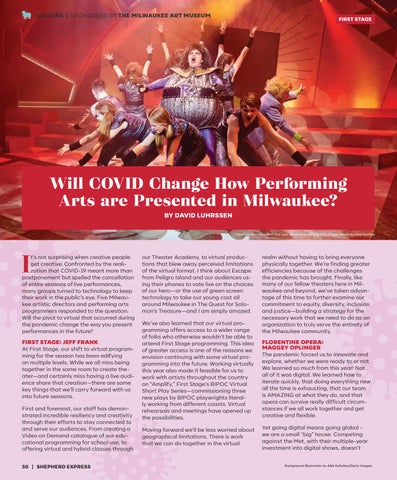CULTURE | SPONSORED BY THE MILWAUKEE ART MUSEUM
FIRST STAGE
Will COVID Change How Performing Arts are Presented in Milwaukee? BY DAVID LUHRSSEN Rick Pendzich (center) and cast. Photo provided by First Stage. Photo by Paul Ruffolo.
I
t’s not surprising when creative people get creative. Confronted by the realization that COVID-19 meant more than postponement but spelled the cancellation of entire seasons of live performances, many groups turned to technology to keep their work in the public’s eye. Five Milwaukee artistic directors and performing arts programmers responded to the question: Will the pivot to virtual that occurred during the pandemic change the way you present performances in the future?
FIRST STAGE: JEFF FRANK At First Stage, our shift to virtual programming for the season has been edifying on multiple levels. While we all miss being together in the same room to create theater—and certainly miss having a live audience share that creation—there are some key things that we’ll carry forward with us into future seasons. First and foremost, our staff has demonstrated incredible resiliency and creativity through their efforts to stay connected to and serve our audiences. From creating a Video on Demand catalogue of our educational programming for school use, to offering virtual and hybrid classes through 50 | SHEPHERD EXPRESS
our Theater Academy, to virtual productions that blew away perceived limitations of the virtual format. I think about Escape from Peligro Island and our audiences using their phones to vote live on the choices of our hero—or the use of green screen technology to take our young cast all around Milwaukee in The Quest for Solomon’s Treasure—and I am simply amazed. We’ve also learned that our virtual programming offers access to a wider range of folks who otherwise wouldn’t be able to attend First Stage programming. This idea of greater access is one of the reasons we envision continuing with some virtual programming into the future. Working virtually this year also made it feasible for us to work with artists throughout the country on “Amplify,” First Stage’s BIPOC Virtual Short Play Series—commissioning three new plays by BIPOC playwrights literally working from different coasts. Virtual rehearsals and meetings have opened up the possibilities. Moving forward we’ll be less worried about geographical limitations. There is work that we can do together in the virtual
realm without having to bring everyone physically together. We’re finding greater efficiencies because of the challenges the pandemic has brought. Finally, like many of our fellow theaters here in Milwaukee and beyond, we’ve taken advantage of this time to further examine our commitment to equity, diversity, inclusion and justice—building a strategy for the necessary work that we need to do as an organization to truly serve the entirety of the Milwaukee community.
FLORENTINE OPERA: MAGGEY OPLINGER The pandemic forced us to innovate and explore, whether we were ready to or not. We learned so much from this year! Not all of it was digital. We learned how to iterate quickly, that doing everything new all the time is exhausting, that our team is AMAZING at what they do, and that opera can survive really difficult circumstances if we all work together and get creative and flexible. Yet going digital means going global we are a small “big” house. Competing against the Met, with their multiple-year investment into digital shows, doesn’t
Background illustration by Alek Koltukov/Getty Images.
















